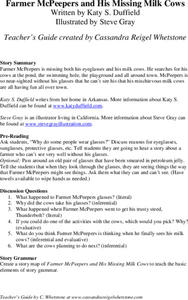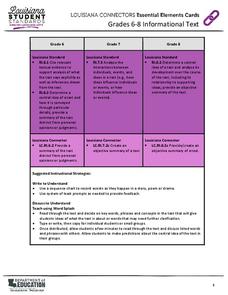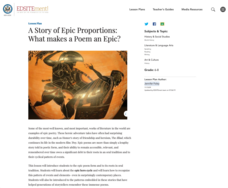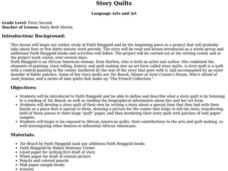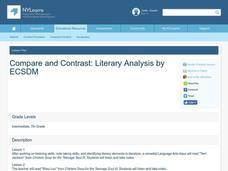Cassandra Reigel Whetstone
Farmer McPeepers and His Missing Milk Cows
Pair your reading of Farmer McPeepers and His Missing Milk Cows with the questions and activities provided here. Learners answer questions about the text, create story maps, put together brochures, relate math to the story, practice some...
Freeology
Annotations Bookmark
In general, pupils are not allowed to write in school-issued books; however, they can write on a bookmark that you provide! Kids can take notes on the setting, characters, themes, and connections as they read a short story or novel.
Curated OER
"The Most Dangerous Game" Study Guide
After reading Richard Connell's best known work, "The Most Dangerous Game," have your class complete the 12 study questions included here. Readers answer plot related questions, compare and contrast characters, and analyze story elements.
Curated OER
Celebrate Change
Students develop fantasy creatures and characters, describing personalities in terms of gestures, actions, and expressions displayed. Then they make fantasy masks, focusing on shape, form, proportion, line, and emphasis to demonstrate...
Louisiana Department of Education
Essential Elements Cards
Use essential elements cards to help lesson plan! Each card contains an informational text common core standard for grade levels six through eight and suggestions for activities and supports. Cards address skills such as citing textual...
Curated OER
Deciding Theme
Read aloud to your class the fable "The Lion and the Mouse" as you explore characters' choices and the effects they have on a story. Apply what is discussed to finding a theme of the chapter "Not Giving Up" from The Wizard of Oz.
National Endowment for the Humanities
A Story of Epic Proportions: What Makes a Poem an Epic?
Learners analyze the epic poem form and its roots in oral tradition. For this epic poetry lesson, young scholars research the epic hero cycle and recognize the pattern of events and elements. Learners analyze the patterns embedded in the...
Curated OER
Genre Lesson: What is a Mystery?
Young scholars identify the characteristics of the genre of mystery. In this genre lesson, students discover the elements of a mystery story and begin recording the elements on a class chart of the book entitled Two-Minute Mysteries:...
Curated OER
Retell the "Tail" of the Tale
Students explore story structure. In this multicultural literacy lesson, students discuss common elements of folk tales and then listen to the story Tiger and the Big Wind: A Tale from Africa. Students identify the problem and solution...
Curated OER
Story Literary Elements Worksheet
In this literary elements worksheet, students read selected short stories and then respond to 5 short answer questions based on the stories.
Curated OER
The School Story by Andrew Clements-Reading Comprehension Packet/Worksheets
Learners practice reading skills by reading The School Story by Andrew Clements and answering questions over that story. For this reading comprehension lesson, students answer questions over story elements, vocabulary, and comprehension...
Curated OER
Convergence with The Cay: Exploring Geographic Concepts Wrapped in a Story
Here's an awesome unit that uses The Cay as the anchor text. The 16-page packet is loaded with teaching ideas, activities, and suggested adjustments.
Pennsylvania Department of Education
Drawing Conclusions Based on Literary Elements
Students compare versions of Cinderella and draw conclusions based on the story elements identified. In this literacy comprehension and story elements lesson, students read several versions of Cinderella, complete a "Comparing Folklore"...
Curated OER
Parts of a Story
In this story worksheet, students read about different story elements such as setting, characters, plot, and theme. Each element is illustrator by a cartoon.
Curated OER
Elements of Messages
Students examine media messages. In this media awareness lesson, students analyze political cartoons and identify the literary elements they incorporate. Students also use the Media Elements Handout to identify the elements in other...
Curated OER
Identifying the Theme in a Story
Students recognize Theme through the use of simple, short stories. Using Pro Quest, students begin by researching the literary element, theme, and how it can be identified. They then identify the themes in Aesop's Fables and other short...
Curated OER
One Story, Many Tales
Students compare and contrast various versions of the fairytale Cinderella. In this folktale lesson, students read The Korean Cinderella and The Egyptian Cinderella and analyze the differences between the two stories. Students identify...
Curated OER
Explore the Elements of Art
Students recognize elements of art such as texture, shape line and color. In this elements of art lesson, students create a still life picture with oil pastel or crayons. Students define elements of art vocabulary. Students relate...
Curated OER
How can we write a silly story?
Second graders use the writing process and create a silly story. In this silly story activity, 2nd graders will review person, event and setting and complete a chart for each. Students will put a person, event and setting in an...
Curated OER
Story map
In this story map worksheet, learners fill in a story map that contains the elements of conflict in a story. Students answer the questions of who, what, and why.
Curated OER
Compare and Contrast: Literary Analysis
Seventh graders are able to use active listening skills, take notes and identify literary elements of a short story. They use/create graphic organizer, compare/contrast literary elements from various stories and compare and contrast traits.
Curated OER
Graphic Organizer: Story Pyramid
In this graphic organizer: story pyramid worksheet, students analyze 6 components of the story (exposition, conflict, rising action, climax, falling action, resolution) and write the details in the boxes.
Curated OER
Story of Self-Choosing to Participate
Everyone has a story; help your writers develop their own with this prewriting packet. Designed for upstanders to share their story and encourage others to be upstanders, this set of questions helps writers craft and structure a story to...
Other popular searches
- Story Elements
- Short Story Elements
- Fable Story Elements
- Teaching Story Elements
- Identify Story Elements
- Story Elements Chart
- Analyze Text Story Elements
- Story Elements Character
- Story Elements Collage
- Identifying Story Elements
- Short Story Elements Quiz
- Story Elements Map


